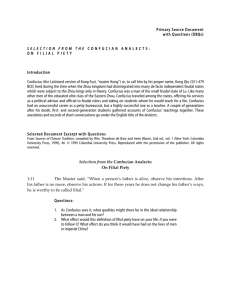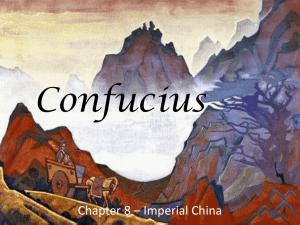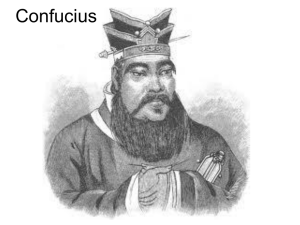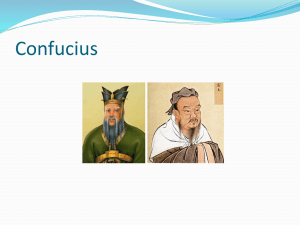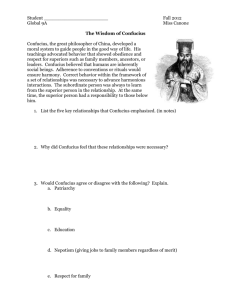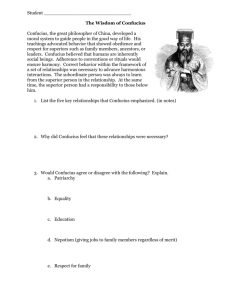1213 - asiandiscovery
advertisement
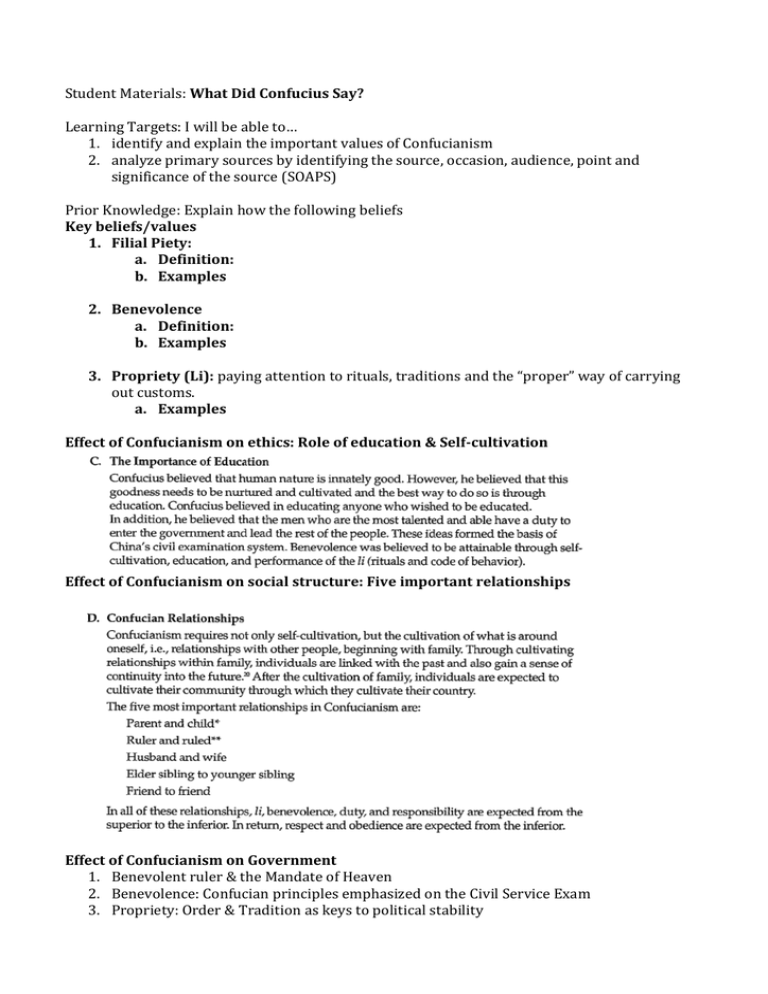
Student Materials: What Did Confucius Say? Learning Targets: I will be able to… 1. identify and explain the important values of Confucianism 2. analyze primary sources by identifying the source, occasion, audience, point and significance of the source (SOAPS) Prior Knowledge: Explain how the following beliefs Key beliefs/values 1. Filial Piety: a. Definition: b. Examples 2. Benevolence a. Definition: b. Examples 3. Propriety (Li): paying attention to rituals, traditions and the “proper” way of carrying out customs. a. Examples Effect of Confucianism on ethics: Role of education & Self-cultivation Effect of Confucianism on social structure: Five important relationships Effect of Confucianism on Government 1. Benevolent ruler & the Mandate of Heaven 2. Benevolence: Confucian principles emphasized on the Civil Service Exam 3. Propriety: Order & Tradition as keys to political stability Expert Group Directions & Group Roles: Facilitator (Reads the introduction & asks questions) Wordsmith: researches the definition of key words Time keeper Individual role: Please write the answer the questions on your own. Filial Piety & Five important relationships Read me first: Filial piety, devotion to one's parents and family members, has always been a central element in Chinese life and thought. It remains so to the present day. The English expression "charity begins at home," from a Chinese point of view, is quite literally true. This is because the Confucian idea is that a person learns to be loving through experiencing live in his family. Becoming a moral person depends on extending to others in an ever widening circle the love and consideration that are fostered in a natural way in the family itself. For Confucius, our being moral is grounded in the most basic human feelings. Yu Tzu (a disciple named Yu Jo) said, "Few of those who are filial sons and respectful brothers will show disrespect to superiors, and there has never been a man who is not disrespectful to superiors and yet creates disorder. A superior man is devoted to the fundamental (the root). When the root is firmly established, the moral law (Tao) will grow. Filial piety and brotherly respect are the root of humanity (jen). (1:2) Filial Piety Questions 1. Vocabulary: define the following terms in your own words a. Filial piety b. Moral c. Virtue 2. Source: What is the source (format)? Who wrote this source? It is a quote from a disciple of Confucius written down in Analects 3. Occasion: What circumstances led to the creation of this source? Confucius lived during a period of war and chaos (Late Zhou Dynasty) 4. Audience: Who is the intended audience? Leaders were looking for advice regarding how to gain power and rule Scholars who were studying for the civil service exam (Han) and get in to the government 5. Purpose: 6. Significance Point 1: Why was filial piety so important to Confucius? 7. Significance Point 2: Confucius and government: a. What was the similarity in the order of relationships within the family and within the government headed by a single ruler? b. Why did Confucius teach filial piety as the basis for a good government? Expert Group Directions & Group Roles: Facilitator (Reads the introduction & asks questions) Wordsmith: researches the definition of key words Time keeper Individual role: Please write the answer the questions on your own. Benevolence & Government Read me first: Benevolence & Government For Confucius, morality and government were so closely related that it was scarcely possible to think about them separately. As you read the following selections, try to form your own idea about the kind of government Confucius was teaching and its possible strengths and weaknesses. Confucius said, "Lead the people with governmental measures and regulate them with laws and punishment, and they will avoid wrongdoing but will have no sense of honor and shame. Lead them with virtue and regulate them by the rules of propriety, and they will have a sense of shame and, moreover, set themselves right." (2:3) A. Vocabulary: define the following terms IN YOUR OWN WORDS propriety hierarchy B. SOAPS analysis 1. Source: What is the source (format)? Who wrote this source? 2. Occasion: What circumstances led to the creation of this source? 3. Audience: Who is the intended audience? 4. Purpose: 5. Significance Point 1: Why is it important for a ruler to be benevolent? Chi K'ang Tzu asked Confucius about government, saying, "What do you think of killing the wicked and associating with the good?" Confucius replied, "In your government what is the need of killing? If you desire what is good, the people will be good. The character of a ruler is like wind and that of the people is like grass. In whatever direction the wind blows, the grass always bends." (12:19) Answer 1. Point: Paraphrase this quote in one sentence using your own words. 2. Significance Point 1: Why is it important for the ruler to be virtuous? Expert Group Directions & Group Roles: Facilitator (Reads the introduction & asks questions) Wordsmith: researches the definition of key words Time keeper Individual role: Please write the answer the questions on your own. Benevolence & Society Read me first: Humanity/”Benevolence” What is benevolence? The Chinese word for benevolence is “Zhen” or “Jen”. The character is written with the “human” symbol on the left while the symbol on the right is the number two. So the basic idea has to do with the way in which human beings relate to one another in society. See if you can develop a feeling for jen on the basis of what follows. Tzu-chang asked Confucius about humanity. Confucius said, "One who can practice five things wherever he may be is a man of humanity." Tzu-chang asked what the five -are. Confucius said, "Earnestness, liberality, truthfulness, diligence, and generosity. If one is earnest, one will not be treated with disrespect. If one is liberal, one will win the hearts of all. If one is truthful, one will be trusted. If one is diligent, one will be successful. And if one is generous, one will be able to enjoy the service of others." (17:6) Vocabulary: Define in your own words 1. Humanity 2. Benevolence 3. Resolute 4. Liberality 5. Diligence 6. Earnestness Answer 1. Source: What is the source (format)? Who wrote this source? 2. Occasion: What circumstances led to the creation of this source? 3. Audience: Who is the intended audience? 4. Purpose: 5. Significance Point 1: What kind of quality or virtue is jen, and what kind of person could be called a person of humanity? Why is this important in society? 6. Compare/contrast: Do you find any similarities between the humanity of Confucius and the guiding principles of another religious tradition with which you may be familiar--for example, love or charity in Christianity, social responsibility in Judaism, or compassion in Buddhism? Any differences? Confucius Quotes from Analects: Use this graphic organizer to help you take notes Quote Topic 1: Filial Piety & Five Relationships Yu Tzu (a disciple named Yu Jo) said, "Few of those who are filial sons and respectful brothers will show disrespect to superiors, and there has never been a man who is not disrespectful to superiors and yet creates disorder. A superior man is devoted to the fundamental (the root). When the root is firmly established, the moral law (Tao) will grow. Filial piety and brotherly respect are the root of humanity (jen). (1:2) Topic 2: Benevolence & impact on government Confucius said, "Lead the people with governmental measures and regulate them with laws and punishment, and they will avoid wrongdoing but will have no sense of honor and shame. Lead them with virtue and regulate them by the rules of propriety, and they will have a sense of shame and, moreover, set themselves right." (2:3) Topic 3: Benevolence & impact on society Tzu-chang asked Confucius about humanity. Confucius said, "One who can practice five things wherever he may be is a man of humanity." Tzuchang asked what the five -are. Confucius said, "Earnestness, liberality, truthfulness, diligence, and generosity. If one is earnest, one will not be treated with disrespect. If one is liberal, one will win the hearts of all. If one is truthful, one will be trusted. If one is diligent, one will be successful. And if one is generous, one will be able to enjoy the service of others." (4: 17) Point/ Evidence Significance
